
Bleeding gums can be very frightening as that is often something that happens unexpectedly. According to research studies, the are many reasons why gums bleed when you are brushing your teeth. Information sites such as WebMD state that reasons for this might be something as small as using a wrong brushing technique to medical reasons that need serious attention.
The Cleveland Clinic states that bleeding gums are the a symptom of gingivitis and other diseases such as periodontal disease. Following are four ways that may stop your gums from bleeding as provided by Healthline.
Practice good hygiene – bleeding gums may be a sign of poor dental hygiene.Gums become inflamed and bleed when there’s a buildup of plaque along the gum line. Plaque is a sticky film containing bacteria that covers your teeth and gums. And if you don’t brush or floss enough, the bacteria can spread and cause tooth decay or gum disease. To improve oral hygiene, brush your teeth at least twice daily and floss once a day. Here are more tips for keeping your teeth healthy. Good oral hygiene is especially important for pregnant women. Hormone fluctuations during pregnancy can also trigger gum disease and bleeding gums.
Rinse your mouth with peroxide – you might keep hydrogen peroxide on hand to use as a disinfectant. Turns out it can also remove plaque, promote gum health, and stop gum bleeding. If your gums are bleeding, rinse your mouth with hydrogen peroxide after brushing, but don’t swallow the solution. Gingivitis is an inflammation of the gums, and this condition can cause bleeding, swelling, and receding gums.
In a study of 99 subjects, some were given a mouth rinse of hydrogen peroxide to study the effectiveness of the solution on reducing gingivitis and whitening teeth. The study found that the group that rinsed with hydrogen peroxide had less gum inflammation than the control group. Bleeding gums aren’t always caused by gum disease. Your gums may also bleed from trauma or an injury to the gum tissue.
Apply a cold compress – a cold compress applied to the gum line can reduce swelling and restrict blood flow to stop bleeding. Apply an ice pack or a cold cloth to your gums several times a day, 20 minutes on and 20 minutes off.
Rinse your mouth with salt water – because bacteria and inflammation in the mouth causes gum disease, regularly rinsing your mouth with a mixture of warm salt water may also reduce bacteria and stop gum bleeding. Add half a teaspoon of salt to a glass of warm water and rinse your mouth for a few seconds three to four times a day. If bleeding is from an injury or trauma, rinsing with a salt water mixture also keeps your mouth clean and removes bacteria that could cause a wound infection.
Also see: Foods and drinks that can ruin your teeth




